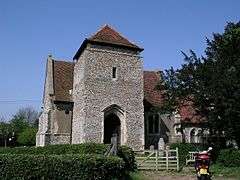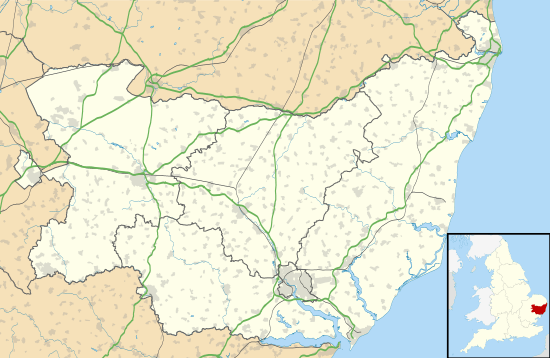Culpho
Culpho (pronounced Cul-fo) is a hamlet and civil parish in the East Suffolk district of Suffolk, about 4 miles (6.4 km) northeast of the centre of Ipswich and 3 1⁄2 miles (5.6 km) west of Woodbridge.
| Culpho | |
|---|---|
 St Botolph's parish church | |
 Culpho Location within Suffolk | |
| Civil parish |
|
| District |
|
| Shire county | |
| Region | |
| Country | England |
| Sovereign state | United Kingdom |
| Post town | Ipswich |
| Postcode district | IP6 |
| Dialling code | 01473 |
| Police | Suffolk |
| Fire | Suffolk |
| Ambulance | East of England |
| UK Parliament | |
Culpho's population is less than 100, so the Office for National Statistics includes it in the total for the civil parish of Grundisburgh for the 2011 census.[1] Other neighbouring villages include Great Bealings, Westerfield, and Playford.
Toponym
The earliest known record of the toponym is Culfole in the Domesday Book of 1086, which list the population as 22 households.[2] In 12th-century records it appears as Colfho in 1168, Culfou in 1169 and Culfo in 1175. A pipe roll of 1178 records it as Culfho and an entry in the Book of Fees for 1250 records it as Colvesho. It is derived from Old English, probably meaning "Cūþwulf's hōh" (hōh = "spur of land").[3]
Parish church
The earliest parts of the Church of England parish church of St Botolph include the chancel, which is 13th-century. The nave has 14th-century features including a doorway and windows. There is also a 14th-century piscina in the chancel. The baptismal font is 15th-century. The church has a southwest tower with the porch built into its ground stage. The nave roof was rebuilt with new timbers in the 17th century.[4]
The church was restored in 1884. It is a grade II* listed building.[4]
St Botolph's church was granted to the Premonstratensian Leiston Abbey in the 13th century.[5] The parish is now part of a shared benefice with Great Bealings, Little Bealings and Playford.[6]
Thankful village
Culpho is one of the Thankful Villages the few dozen parishes in England and Wales that suffered no fatalities in the First World War.
References
- UK Census (2011). "Local Area Report – Grundisburgh Parish (E04009412)". Nomis. Office for National Statistics. Retrieved 19 June 2019.
- "Culpho | Domesday Book". opendomesday.org. Retrieved 19 June 2019.
- Ekwall 1960, Culpho
- Historic England. "Church of St Botolph (Grade II*) (1030504)". National Heritage List for England. Retrieved 31 March 2014.
- Page 1907, pp. 117–119.
- "Great Bealings & Little Bealings with Playford & Culpho (Benefice)". Diocese of St Edmundsbury and Ipswich. Retrieved 26 August 2018.
Bibliography
- Ekwall, Eilert (1960) [1936]. Concise Oxford Dictionary of English Place-Names (4th ed.). Oxford: Oxford University Press. Culpho. ISBN 0198691033.CS1 maint: ref=harv (link)
- Lewis, Samuel, ed. (1931) [1848]. A Topographical Dictionary of England. I (Seventh ed.). London: Samuel Lewis. pp. 746–751.CS1 maint: ref=harv (link)
- Page, William, ed. (1907). A History of the County of Suffolk. Victoria County History. II: Ecclesiastical History, Religious Houses, Political History, Maritime History, Industries, Schools, Sport, Agriculture, Forestry. Westminster: Archibald Constable & Co. pp. 117–119.CS1 maint: ref=harv (link)
- Pevsner, Nikolaus; Radcliffe, Enid (revision) (1974) [1961]. Suffolk. The Buildings of England. Harmondsworth: Penguin Books. p. 182. ISBN 0-14-071020-5.CS1 maint: ref=harv (link)